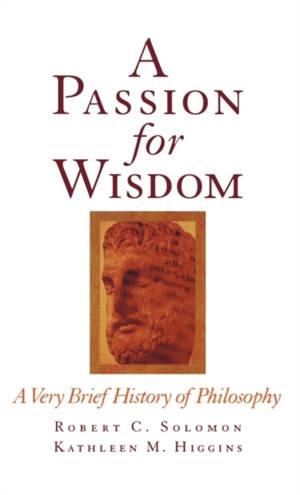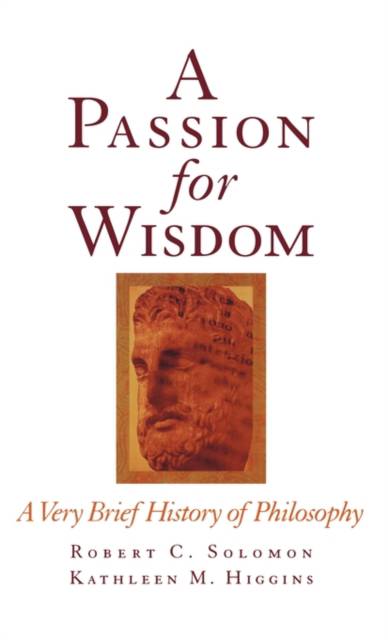
- Retrait gratuit dans votre magasin Club
- 7.000.000 titres dans notre catalogue
- Payer en toute sécurité
- Toujours un magasin près de chez vous
- Retrait gratuit dans votre magasin Club
- 7.000.0000 titres dans notre catalogue
- Payer en toute sécurité
- Toujours un magasin près de chez vous
154,45 €
+ 308 points
Format
Description
When the ancient Greek philosopher, Pythagoras, was asked if he was a wise man, he humbly replied "No, I am only a lover of wisdom." This love of wisdom has been central to the philosophical enterprise for thousands of years, inspiring some of the most dazzling and daring achievements of the human intellect and providing the very basis for how we understand the world. Now, readers eager to acquire a basic familiarity with the history of philosophy but intimidated by the task will find in A Passion for Wisdom: Philosophy Through the Ages, a lively, accessible, and highly enjoyable tour of the world's great ideas.
Without simplifying their subject, editors Robert Solomon and Kathleen Higgins tell the story of philosophy's development with great clarity and refreshing wit. The brevity of their study, in fact, allows readers to see more clearly the connections and divergences between philosophers, as well as the way ideas change, reappear, and evolve over time. The authors begin with the most ancient religious beliefs and bring us right up to the feminist and multicultural philosophies of the present. Along the way, major philosophers are highlighted, from Plato and Aquinas to William James and Simone deBeauvoir, and major categories explored, from metaphysics and ethics to politics and logic. We also see the evolution of enduring ideas--how, for example, the value of subjective experience is treated in Augustine, Luther, Descartes, and Kirkegaard, how the idea of dynamic change appears in the work of Heraclitus, Darwin, Hegel, and Nietzsche, and how the recurring dichotomies between faith and reason, belief and skepticism, mysticism and empiricism occupy philosophers from one generation to the next. The authors make clear the many ways philosophers have argued with, borrowed from, and built on each other's ideas throughout the ages. We see Francis Bacon rejecting Aristotelian dogma, the impact of Buddhism on Schopenhauer, and the influence of Hume and Rousseau on the monumental philosophy of Imanuel Kant. The book is enlivened as well by telling anecdotes and sparkling quotations. We're treated to Thomas Hobbes' assessment--"Life is nasty, brutish, and short," Hegel's description of Napoleon as "world history on horseback," Schopenhauer's assertion that Art allows us a "Sabbath from the penal servitude of willing," and many other memorable and provocative observations.
Accessible, comprehensive, and delightfully written, A Passion for Wisdom is a splendid introduction to an intellectual tradition that reaches back over three thousand years. More than that, it is a much-needed reminder for the present of the power inherent in humanity's wonder before the world.
Without simplifying their subject, editors Robert Solomon and Kathleen Higgins tell the story of philosophy's development with great clarity and refreshing wit. The brevity of their study, in fact, allows readers to see more clearly the connections and divergences between philosophers, as well as the way ideas change, reappear, and evolve over time. The authors begin with the most ancient religious beliefs and bring us right up to the feminist and multicultural philosophies of the present. Along the way, major philosophers are highlighted, from Plato and Aquinas to William James and Simone deBeauvoir, and major categories explored, from metaphysics and ethics to politics and logic. We also see the evolution of enduring ideas--how, for example, the value of subjective experience is treated in Augustine, Luther, Descartes, and Kirkegaard, how the idea of dynamic change appears in the work of Heraclitus, Darwin, Hegel, and Nietzsche, and how the recurring dichotomies between faith and reason, belief and skepticism, mysticism and empiricism occupy philosophers from one generation to the next. The authors make clear the many ways philosophers have argued with, borrowed from, and built on each other's ideas throughout the ages. We see Francis Bacon rejecting Aristotelian dogma, the impact of Buddhism on Schopenhauer, and the influence of Hume and Rousseau on the monumental philosophy of Imanuel Kant. The book is enlivened as well by telling anecdotes and sparkling quotations. We're treated to Thomas Hobbes' assessment--"Life is nasty, brutish, and short," Hegel's description of Napoleon as "world history on horseback," Schopenhauer's assertion that Art allows us a "Sabbath from the penal servitude of willing," and many other memorable and provocative observations.
Accessible, comprehensive, and delightfully written, A Passion for Wisdom is a splendid introduction to an intellectual tradition that reaches back over three thousand years. More than that, it is a much-needed reminder for the present of the power inherent in humanity's wonder before the world.
Spécifications
Parties prenantes
- Auteur(s) :
- Editeur:
Contenu
- Nombre de pages :
- 160
- Langue:
- Anglais
Caractéristiques
- EAN:
- 9780195112085
- Date de parution :
- 01-05-97
- Format:
- Livre relié
- Format numérique:
- Genaaid
- Dimensions :
- 147 mm x 218 mm
- Poids :
- 340 g

Les avis
Nous publions uniquement les avis qui respectent les conditions requises. Consultez nos conditions pour les avis.






